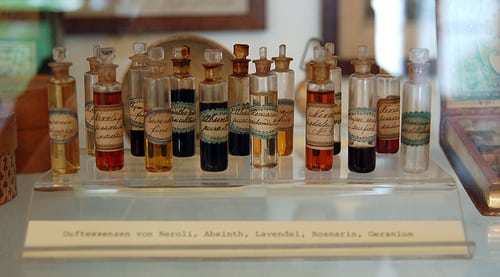Image by ilovebutter
Written by Karen, Guest Writer
It’s hard to believe that it’s been ten weeks already. I’ve really enjoyed writing for you all and I hope you’ve enjoyed and learned a lot from the series. So far, we have covered nine topics:
1.) What are essential oils, how are they classified, and how are they made?
2.) Are essential oils safe? What are indicators of essential oil quality?
3.) What are the three main ways that essential oils are used? What oils are good or best to use in each different way.
4.) I think I had a reaction to an essential oil! What’s going on?
5.) What are some useful reference materials that can be used to learn about essential oils?
6.) What are some good food recipes for use with essential oils?
7.) What are some helpful cleaning recipes for use with essential oils?
8.) What are some beneficial personal hygiene recipes for use with essential oil?
9.) I’m going on a trip. What essential oils should I take with me, and how do I carry them?
As we close this series, we’re going to talk about some usage tips for essential oils.
Tip #1 – Never put essential oils into plastic.
Let’s say your stomach is upset and you want to add a little peppermint oil to your plastic water bottle that you have with you. I would highly recommend against it. The chemicals in the plastic will leach into your water because of the essential oil. Instead of calming your stomach, it will usually make your stomach more upset. Instead of using bottled water or a plastic water bottle, I’d recommend one like this. This is a glass water bottle in a silicon sleeve to keep the bottle from breaking easily.
The same would go with food that you have made and into which you have put essential oils. Do not wrap them in plastic wrap or store them in plastic containers. Make sure you use glass. I love storing left overs in mason jars. Small Pyrex baking pans with lids also work well for storing food in which you’ve used essential oils.
Tip #2 – Never use an essential oil in or near your eyes.
Essential oils will burn your eyes. If you get an essential oil in your eyes, NEVER use water to rinse the oil out. This will only drive the oil further into your eyes and surrounding skin. Rinse your eye with milk, almond milk, or coconut milk. This will best neutralize the burn of the oil. Once your eye is no longer burning, you can rinse the milk out with water.
Tip #3 – If an oil feels hot or leaves a burning sensation on your skin, you can dilute it with a carrier oil.
Certain oils are recommended to be diluted. These would include calamus, cassia, lemongrass, oregano, cinnamon bark, clove, lemon myrtle, thyme, and mountain savory among others. If you put one of these oils directly on your skin and forget to dilute it in a carrier oil first, you can apply a carrier oil directly to your skin. This will dilute the oil even on your skin and should stop the burning altogether. This will also work with oils which feel hot even if they are not on the list of oils which should be diluted. Carrier oils include EVOO, coconut oil, The cardiotoxic effects are indirectly mediated by an increase in sympathomimetic stimulation to the heart and coronary vasculature and by a direct effect on the ion channels responsible for maintaining the electrical excitability of the heart. and almond oil.
Tip #4 – Never use an essential oil IN your ear.
If you have an ear infection, congested ears, or other ear condition for which you want to use essential oils, you have two basic options. Your first option is to rub the oils behind and in front of your ears. This will allow the oils to penetrate the skin and into the area which you want to treat. Your second option is to put several drops of the essential oil onto a small cotton ball which will fit snugly into your ear canal. This will allow the essential oil to penetrate into your ear through the skin inside your ear, without actually dropping the oils into your ear canal.
Tip #5 – Avoid direct sunlight after using certain oils.
Certain oils can cause an extreme photosensitivity reaction. When using these oils topically you should avoid going out into direct sunlight for 12-24 hours. These oils include (but are not limited to) Bergamot, Cumin, Lime, and Orange.
Disclaimer:
The information provided in this article is for educational purposes only. It is not intended to prescribe, diagnose, treat, cure, or prevent any disease. It is your responsibility to educate yourself on essential oils and their uses. Address any health or medical needs you may have with your physician. Please seek professional help when needed.
Which EO 101 lesson did you find the most helpful and why? What other topics do you wish were covered? Do you feel like you have a better understanding of essential oils now than you did before we started this series?
Karen Morris is a Christian, a wife of seventeen years to Steve, and homeschooling mom of five beautiful children. She has just launched a business called eSCENTial Remedies (Facebook) which will educate people on essential oils and other holistic remedies and prepare people to care for their own health during their everyday illnesses as well as during any unforeseen circumstances.


